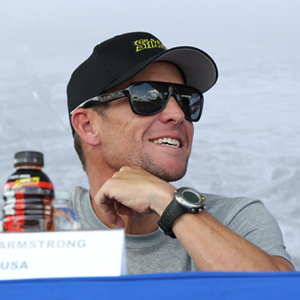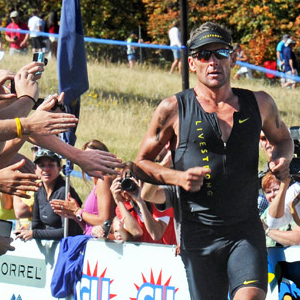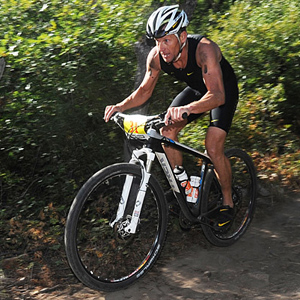Armstrong’s Ironman Ban Not Necessarily a Done Deal

World Triathlon Corporation is weighing its anti-doping policies. Multiple announcements and tweets on Lance Armstrong's Ironman status, and on WTC's policy toward subjects of doping investigations, were variously made and retracted today, painting a picture of a triathlon community divided. WTC's by-now-infamous anti-doping policy is not entirely set in stone—Armstrong's Ironman ban not quite a done deal.
Earlier this week USADA announced a doping investigation against Armstrong and, while any censure or sanction against Armstrong would be many months away even if USADA's prosecution is successful, WTC immediately suspended Armstrong from racing any of its races, in accordance with a stringent policy that enjoined any athlete under a doping investigation from taking part in an Ironman or other WTC-owned or licensed event.
One option available to WTC—which it's noodling according to sources familiar with the story—is to immediately recraft its policy, and throw the onus of sanctions and bans on national and international governing bodies and National Anti-Doping Agencies (NADOs). In so doing WTC, owner of the Ironman brand of triathlon events, would honor any bans levied by these agencies; but WTC would jettison its current doctrine of enacting its own doping bans. This would bring WTC into closer conformity with both the WADA Code and the SOPs of virtually all sports under the Olympic and federation system umbrella.
Triathlon is one of those federation sports, and neither its World nor U.S. governing bodies has issued any ban on Armstrong, nor would they prior Armstrong exhausting his rights, which include a current presumption of innocence.
The other option is for WTC to leave its current policy in place. This policy is one that Andrew Messick, WTC's chief executive for just under a year, inherited from his predecessor. Draconian by almost any metric, the policy was modeled after the agreements professional cyclists are forced to sign with the teams which employ them. This contract provision became an imperative because of a systemic doping problem in cycling that has chased sponsors away in droves. Top level bike racing is particularly vulnerable to the departure of large non-endemic sponsors, who have grown averse to the stream of doping stories that emanate from cycling. These doping scandals have largely sidestepped the sport of triathlon.
Nevertheless, there are those in the triathlon community who feel that the the optics of changing a policy only because a high profile athlete fell afoul of it are bad. This, even if WTC's policy mirrors that of professional cycling, which is otherwise almost alone in its response to doping violations. Emblematic of this view is T.J. Tollakson, an Ironman Lake Placid winner, who wrote to Slowtiwtch that,
"Racing is a privilege, not a right, and therefore is not subject to the same rules as the justice system. In sport we do not grant an athlete under investigation the same privileges as those athletes not under investigation. The rule was in place for a reason and should not be changed on the impetus of Lance Armstrong providing exposure for the sport. Lance is already a polarizing figure in the sport and in the country, the WTC need not jump into bed and amend rules based on a single athlete with celebrity status. The rules are the same for all athletes, and the privilege of racing belongs to those abiding by the rules. Abiding by the rules includes sitting out while under investigation."
Holding a contrary view is Jordan Rapp, a 4-time Ironman winner and reigning ITU World Long Course champion (and Slowtwitch.com's chief technology officer). Like Tollakson, Rapp is a university degreed engineer. Rapp is also involved in a visible and public rivalry with Armstrong. He nevertheless wrote to Messick the statement below:
"I would fully support a revision of the WTC 'open investigation' policy that would allow Lance to continue to race. I support the reasoning behind the policy. However, given that there is not a rigorous or well defined set of rules for what allows a NADO (or NGB in the absence of a NADO) to make an open investigation, I feel that the WTC policy is not underpinned by a robust set of rules and laws and therefore do not support the policy as it is currently worded. The WTC policy would be fine if there was a legal process with some recourse to an investigation being opened. But there is not. And that concerns me. If USADA/WADA issues a ban, I think it's absolutely right and critical to honor that. But if not, I think it's wrong to disallow someone simply because he or she is being investigated. That seems to me to make a firm presumption of guilt, and no matter how strongly the deck is stacked, I don't think it's ever right to simply presume guilt in the absence of evidence. Certainly, absence of evidence is not the same as evidence of absence, but I do think it's unfair to disregard the fundamental right of being considered innocent until proven guilty, a right which USADA itself recognizes.
"I ask myself, simply, would I want to be fired from my job simply because someone was investigating me for wrongdoing? And the answer is that I would not. And that is, basically, what I believe the [existing] WTC policy does. Suspicion alone should not keep someone off of the race course."
Messick is no stranger to cycling. His job only a year ago was chief executive of one of cycling's top-5 bike races worldwide, the Amgen Tour of California. The questions in front of his organization are two: Can it parse between the culture and atmosphere extant in cycling versus triathlon, and tailor athlete policies appropriate to each? Second, even if his organization's doping policy should be changed, should the change be made off-calendar?
Armstrong had been in Nice, France, preparing to participate in Ironman France. The Ironman ban prompted him to schedule a return to the United States. Rumblings of a possible amendment by WTC in its policy began to surface yesterday, and triggered an itinerary change for the superstar cyclist and triathlete. He chose to remain in France to compete in the upcoming Ironman there. Now he's in limbo, awaiting a decision that is likely to be made today, or over the weekend.
As noted, Armstrong has options. Contrary to what has been reported elsewhere—including, initially, here on Slowtwitch—he is under no sportwide ban. Should WTC leave its policy in place, Armstrong can compete in any triathlon he wishes, anywhere in the world, federation sanctioned or not, with the sole exception of Ironman and other WTC-owned races.
Should WTC change its policy, Armstrong would also likely compete in October's Hawaiian Ironman Triathlon World Championship, depending on USADA's investigation and hearing timetable.
In a poll currently ongoing, 72 percent of Slowtwitchers feel WTC should set aside its current policy and allow Armstrong to race pending the outcome of his NADO hearings, 28 percent feel the policy should stay in place. Seventy-five percent of Slowtwitch readers list WTC's Ironman or 70.3 events as their "A" races in any given year. The poll is less than a day old, with about 800 having responded as of this writing. This, out of about 85,000 unique visitors over the past 2 days, and about 600,000 unique visitors over the past 30 days.



